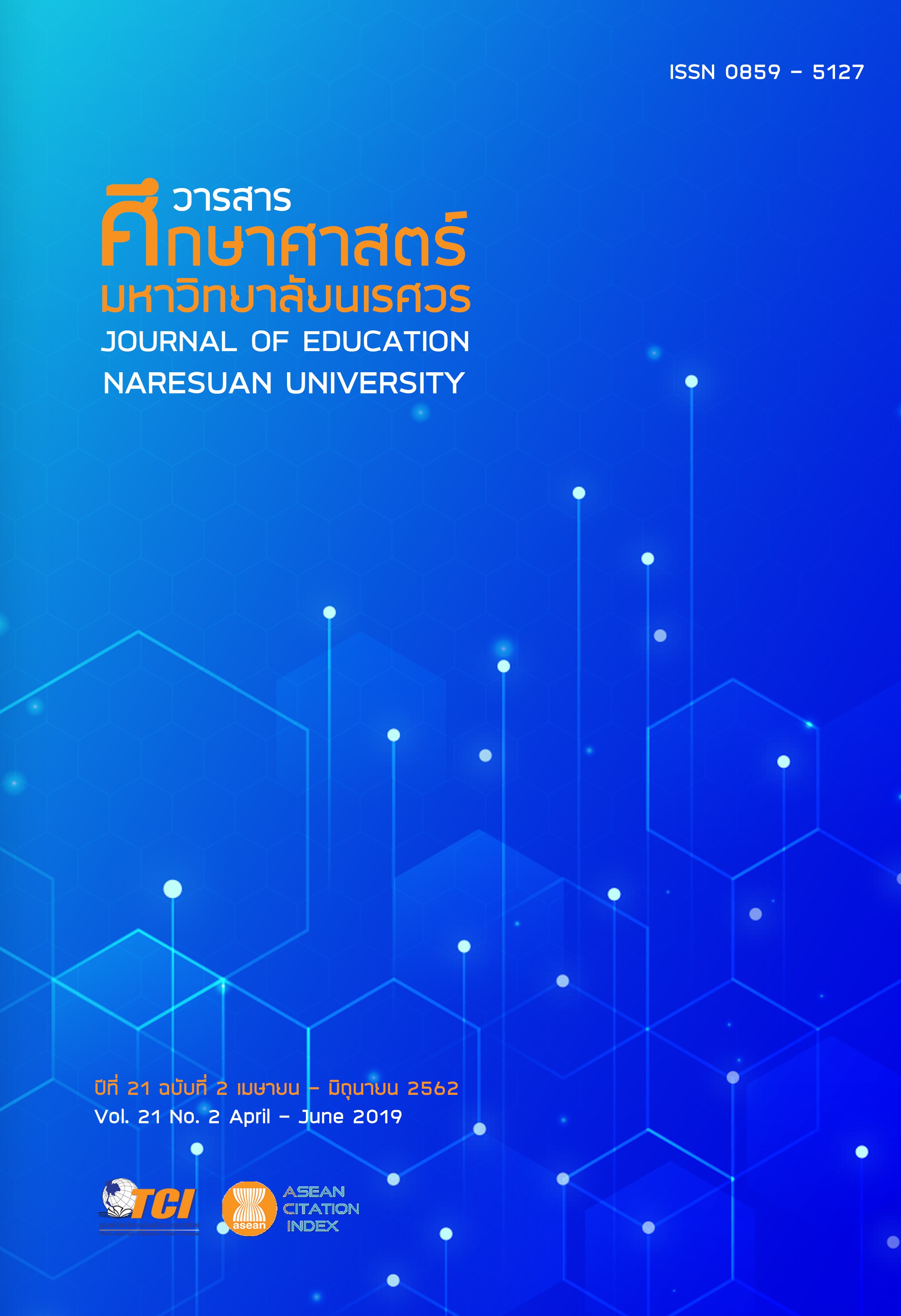การส่งเสริมความเข้าใจและการใช้แบบจำลองในการเรียนการสอนวิทยาศาสตร์: กรณีศึกษากับครูวิทยาศาสตร์ประจำการ (FACILITATING UNDERSTANDING AND USE OF MODELS IN TEACHING AND LEARNING SCIENCE: A CASE STUDY WITH IN-SERVICE SCIENCE TEACHERS) กรณีศึกษากับครูวิทยาศาสตร์ประจำการ
Main Article Content
Abstract
การวิจัยนี้มีวัตถุประสงค์เพื่อศึกษาและพัฒนาความเข้าใจของครูวิทยาศาสตร์ 3 คน เกี่ยวกับแบบจำลองและการใช้แบบจำลองในการเรียนการสอนวิทยาศาสตร์ การวิเคราะห์ข้อมูลจากการสัมภาษณ์แบบกึ่งโครงสร้างรายบุคคลเปิดเผยว่า ครู 2 คน เข้าใจแบบจำลองในฐานะสิ่งทางกายภาพ ในขณะที่ครูอีก 1 คน เข้าใจแบบจำลองในฐานะแผนภาพ โดยครูทั้ง 3 คน มองว่า แบบจำลองช่วยยกระดับการเรียนการสอนวิทยาศาสตร์ โดยเฉพาะการทำหน้าที่เป็นสื่อในการอธิบายความรู้ทางวิทยาศาสตร์ อย่างไรก็ดี หลังจากการเรียนรู้เกี่ยวกับธรรมชาติของแบบจำลอง และการได้รับข้อเสนอแนะผ่านการโค้ชชิ่ง ครู 2 คนแรกได้ขยายความเข้าใจเกี่ยวกับความหลากหลายของแบบจำลอง และเปิดโอกาสให้นักเรียนได้สร้างแบบจำลองด้วยตนเอง ยิ่งไปกว่านั้น 1 ในครู 2 คนนี้ ยังใช้แบบจำลองเป็นเครื่องมือในการประเมินผลการเรียนรู้ของนักเรียน อย่างไรก็ตาม ครูอีกคนหนึ่งไม่ได้แสดงการเปลี่ยนแปลงความเข้าใจและการใช้แบบจำลองมากนัก ข้อสังเกตคือว่า การได้รับข้อเสนอแนะระหว่างการโค้ชชิ่งมีส่วนช่วยให้ครูได้ลองปรับเปลี่ยนการปฏิบัติการสอน ซึ่งทำให้ครูได้รับผลย้อนกลับเชิงบวกจากนักเรียน และพัฒนาความเข้าใจเกี่ยวกับแบบจำลองอย่างมีความหมาย
FACILITATING UNDERSTANDING AND USE OF MODELS IN TEACHING AND LEARNING SCIENCE: A CASE STUDY WITH IN-SERVICE SCIENCE TEACHERS
This research aimed to explore and develop 3 science teachers’ understandings and uses of models in teaching and learning science. Analysis on data using an individual semi-structured interview method revealed that two teachers understood models as physical things and that the other teacher understood models as pictures. All three teachers viewed that models help enhance teaching and learning science, especially being as media in explaining scientific knowledge. However, after learning about nature of models and getting suggestions through coaching, the first two teachers extended their understanding about various forms of models, and also provided students to construct models themselves. Additionally, one of these two teachers also used models as a tool to assess students’ learning. However, the other teacher did not notably express a change in understanding and uses of models. An observation was that getting suggestions during coaching helped the teachers change their teaching practices, which resulted them in getting positive feedbacks from students and developing understandings of models meaningfully.
Article Details
The owner of the article does not copy or violate any of its copyright. If any copyright infringement occurs or prosecution, in any case, the Editorial Board is not involved in all the rights to the owner of the article to be performed.
References
2. Harrison, A. G., & Treagust, D. F. (2000). A typology of school science models. International Journal of Science Education, 22(9), 1011-1026.
3. Henze, I., Van Driel, J. H., & Verloop, N. (2008). Development of experienced science teachers’ pedagogical content knowledge of models of the solar system and the universe. International Journal of Science Education, 30(10), 1321-1342.
4. Kang, G. Y. (2016). The value of coaching: Collaborative relationships spur professional growth. Journal of Staff Development, 37(5), 49-52.
5. Kikuakul, S. (2018). Qualitative research: A distinguished paradigm and misconceptions. Journal of Education Naresuan University, 20(1), 272-283. [in Thai]
6. Ladachart, L. (2017). Facilitating preservice biology teachers’ understandings about using models in teaching and learning science. Thammasat Journal, 36(2), 77-101. [in Thai]
7. Ladachart, L., & Ladachart, L. (2017a). Coaching for teacher professional development. Journal of Education Prince of Songkla University (Pattani Campus), 28(3), 1-12. [in Thai]
8. Ladachart, L., & Ladachart, L. (2017b). Science teachers’ perspectives on and understandings about scientific models. Journal of Community Development Research (Humanities and Social Sciences), 10(3), 149 – 162. [in Thai]
9. Lincoln, Y. S., & Guba, E. G. (1985). Naturalistic inquiry. California: Sage Publications.
10. Luft, J. A. (2001). Changing inquiry practices and beliefs: the impact of an inquiry-based professional development programme on beginning and experienced secondary science teachers. International Journal of Science Education, 23(5), 517-534.
11. Pluta, W. J., Chinn, C. A., & Duncan, R. G. (2011). Learners’ epistemic criteria for good scientific models. Journal of Research in Science Teaching, 48(5), 486-511.
12. Schwarz, C. V., & White, B. Y. (2005). Metamodeling knowledge: Developing students’ understanding of scientific modeling. Cognition and Instruction, 23(2), 165-205.
13. Treagust, D. F., Chittleborough, G., & Mamiala, T. L. (2002). Students’ understanding of the role of scientific models in learning science. International Journal of Science Education, 24(4), 357-368.
14. Van Driel, J. H., & Verloop, N. (1999). Teachers’ knowledge of models and modelling in science. International Journal of Science Education, 21(11), 1141-1153.
15. Yin, R. K. (2014). Case study research: Design and methods (5th ed.). Los Angeles: Sage Publications.


